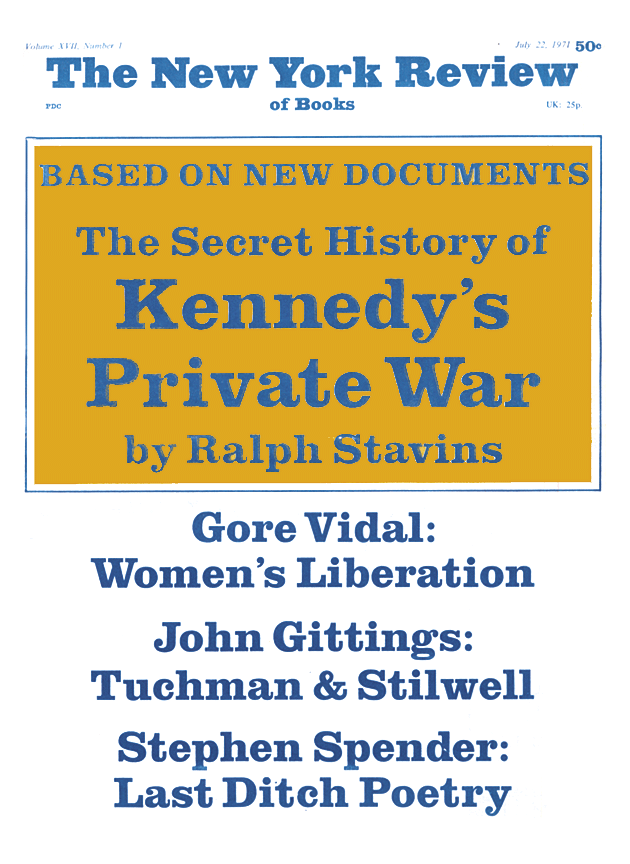In response to:
The Case of Heberto Padilla from the June 3, 1971 issue
To the Editors:
Jose Yglesias’s article on the plight of the Cuban poet Heberto Padilla [NYR, June 3] quotes the theme of his entry in a 1968 literary contest as: “Life is not a walk across an open field.” It is impossible to overlook the resemblance to the Russian proverb Pasternak uses as the last line of his poem “Hamlet”: Zhizn’ prozhit’—ne pole pereiti, literally, “To live a life through is not to walk across a field,” or as Lydia Pasternak Slater translated her brother’s line, “Life is not a walk across a field,” almost identical with the English version, quoted by Yglesias.
This apparent borrowing permits us to wonder if Padilla concluded after two years in the USSR that Pasternak’s way is the poet’s way in a revolutionary Marxist society, a hard way indeed, beset to the bitter end with the murderous political ambushes he has already begun to experience.
The full text of Mrs. Slater’s version of the poem follows:
The murmurs ebb: onto the Stage I enter.
I am trying, standing in the door,
To discover in the distant echoes
What the coming years may hold in store.The nocturnal darkness with a thousand
Binoculars is focused onto me.
Take away this cup, O Abba, Father,
Everything is possible to thee.I am fond of this thy stubborn project,
And to play my part I am content.
But another drama is in progress,
And this once, O let me be exempt.
But the plan of action is determined,
and the end irrevocably sealed.
I am alone; all around me drowns in falsehood:
Life is not a walk across a field.
“Hamlet” is the first poem in the collection at the end of Doctor Zhivago, titled “Poems of Yurii Zhivago.” Before the novel was published in Italy, the text of the poem arrived in America in typescript (I first read the poem, I think, in 1956). Impressed by the dramatic arrival of a smuggled poem, and not yet aware of its place in the novel, several of us ventured a topical interpretation, as though it were to be read as some kind of message. Though he assures the multiple figure of the father-creator—God, his father’s ghost, Shakespeare—that he will fulfill “thy stubborn design,” he asks for a respite though he knows that a life lived through is complex and painful—not merely “a walk across a field.” Whether Hamlet’s act of revenge, or Christ’s of self-sacrifice, or the ordinary man’s acquiescence in his mortality—the end is death.
Was Pasternak telling us that he would soon risk his life by some exemplary act against the Pharisees (Mrs. Slater translates the Russian fariseistvo—literally “Pharisaism”—as “falsehood”)? It seemed plausible then, and still not impossible, to see the illegal publication of Doctor Zhivago as the consummation of that act, with the dire consequences he foresaw. And if we think of the poem’s author as Zhivago, the act is the same, the writing of a stubbornly independent literary work—his body of poems—flung in the face of the governing dogmas, and celebrating the intractable uniqueness of individual lives.
Those who know Heberto Padilla and his work will have to decide whether or not his apparent reference to Pasternak carries any of these political meanings or whether he is using “walk across an [open] field” in the simpler sense of the proverb: as a rebuttal to any who propose simplistic solutions to complex private or public problems….
Rufus W. Mathewson, Jr.
Department of Slavic Languages
Columbia University, New York City
Jose Yglesias replies:
Reading Pasternak’s poem again I’m certain that Padilla deliberately chose that last line, but I doubt very much that he saw himself in any of the roles that Mr. Mathewson calls “the political meanings” of Pasternak’s writings and actions. I don’t even know that it is true of Pasternak, doleful man though he was: in his letter pleading not to be exiled Pasternak paraphrased Othello with “I have done the state some service….”—and that implies that he saw himself less as a loner than Mr. Mathewson sees him. About Padilla I can say that the evening he received his copy of his book and read the introduction by the UNEAC Committee attacking him, he said to me, “The last thing I want to be is the Rebel Poet in a socialist society. I saw what it did to Yevtushenko.” That was said as if it had just occurred to him, and in a moment he explained that to be cast in such a role can lead to posturing and could deflect him from simply being himself. Of course his choice of Pasternak’s line primarily means that he was opposed “to any who propose simplistic solutions,” but this is not the “simpler sense” of the line. For someone as concerned as Padilla with the revolutionary experience this sense is denser, more fruitful—in poetry as well as politics—than dramatic posturing.
This Issue
July 22, 1971


